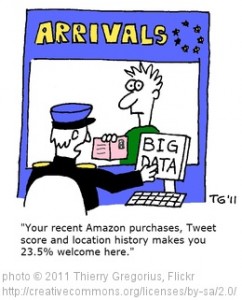As far as self-obsession is concerned, technology is the ultimate enabler. Thanks to smartphones, tablets, and laptops, I now keep a record of my daily caloric intake and expenditure, quality of sleep, walking speed, personal happiness, internal dialogue and thought stream, and productivity during work. The “Track Your Happiness” app asks how I feel at random times in the day, providing a real time record of my state of well-being. “Sparkpeople” takes my daily food intake and calculates the breakdown by fats, carbohydrates and protein, putting a happy green when I meet my goals and coloring an angry red when I overeat. And “Quantified Mind” on my PC takes everything to a whole new level by letting me run experiments on myself; testing, for example, whether butter makes me dumber (answer: it does).
 Self-quantifying apps bring the power of big data right into an individual’s daily life. While Facebook runs experiments on election voters and Google uses search words to predict disease outbreaks, I use the data on my phone to discover new things about myself. For example, I’ve found that if I eat late at night, I wake up nearly three times as often during the night and subsequently feel much less rested. I also found out that after an online chat, I spend an incredible average of 26 minutes before I am able to return to my previous activity for more than 20 seconds. 26 minutes– that’s the equivalent of a Seinfeld episode, but much less pleasant.
Self-quantifying apps bring the power of big data right into an individual’s daily life. While Facebook runs experiments on election voters and Google uses search words to predict disease outbreaks, I use the data on my phone to discover new things about myself. For example, I’ve found that if I eat late at night, I wake up nearly three times as often during the night and subsequently feel much less rested. I also found out that after an online chat, I spend an incredible average of 26 minutes before I am able to return to my previous activity for more than 20 seconds. 26 minutes– that’s the equivalent of a Seinfeld episode, but much less pleasant.
The apps that are currently on the market mine this data and let me set goals for myself based on the patterns. My favorite example is “RescueTime”, which showed me that when I spend more than half an hour searching the news, I actually stop reading any of them and instead dissolve into endless tabbing of potentially interesting stories. Mercifully, it then let me block the Twitter feed that kept giving me new articles for a full half hour, while I focus on finishing the ones I’ve opened.
While historical tracking is great, the real (yet unmined) potential of personal quantification lies with the power it has to predict the future. I am, in many ways, a mystery to myself; often making little more than guesses about the way I will act and then crossing my fingers that they are correct. Big data might allow me for the first time to have a magic ball for my own behavior.
If I click on this link, will I sink half hour into the whole of more clicking? “TrackEye” tells me that my eyes are moving too quickly for me to be reading anything.. Should I go to Chelsea or the Lower East Side for a fun night out? “MyPlaces” calculates an average mood of 4 out of 5 for Chelsea, but only 3.5 out of for LES. And if I send this email, will I regret it later on? Well, not to try to tell you what to do, but word analytics detects a higher than normal amount of negative affect words.
Big data has revolutionized commerce, public health, and social networks. It’s only a matter of time before its power gives us the tools to control the future of our personal lives.
